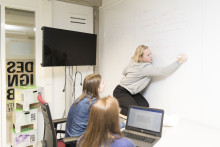Being a painter and a teacher are probably the only two jobs people think their uncle and everyone else they know can do. I did/do both. Teaching sometimes seems to be perceived as a more or less innate ability that requires no pedagogical know-how, but ‘only’ experience and domain-specific knowledge. You hear comments like ‘I was a student myself, I remember what good teachers do’ or ‘I've been teaching for 10 years, I know how to transfer knowledge’.
But are these arguments valid? Do experts automatically make good teachers and could it be that simply interacting with something is enough to develop a deeper understanding? I've seen hundreds of films, and I’m very passionate about many of them, but I wouldn't know how to make a good one. I drive a lot, I love to drive, but I wouldn't know what it takes to build a good car. Sure, experience is important, but even years of experience mean little if you've done it incorrectly and you’re not self-reflective. But let's assume that all experts are self-reflective. Then what about the domain-specific knowledge, which, apart from experience, seems to be sufficient to teach?
The thing is, people who become experts in their field sometimes forget what it was like to be a novice, making it difficult for them to teach and support others effectively. This is called expert blindness. In a New York Times article, organisational psychologist Adam Grant aptly wrote: 'I arrived at Harvard as an undergraduate, excited to soak up the brilliance of professors who had won Nobels and Pulitzers. But by the end of the first month of my freshman year, it was clear that these world-class experts were my worst teachers. Or as cognitive psychologist Sian Beilock, mentioned in the same article, puts it: 'Your ability to communicate your understanding to others often gets worse and worse as you get better and better at what you do.'
Teachers are the quardians
Now let's cautiously postulate that domain-specific knowledge and experience are not always enough to become an effective teacher. Who might conclude this and how? An educational scientist? The University Teaching Qualification (UTQ)? One could argue that you need content knowledge to be able to say anything about someone else's teaching. I would argue that it is probably even better not to have it. Educational science is about how we impart that knowledge. Students are not voids into which information can be poured and the rest will take care of itself. There is not only a huge knowledge gap between teachers and students, there is also a difference in the way information is organised in the brain.
Tailoring teaching to this is one of the important parts of the UTQ. Besides, there’s plenty of evidence-based research (like a lot) on how to teach without the researcher being a content expert, simply because you don't always need to be. More importantly, teachers are the guardians of a university's threshold standards. By setting clear targets, in line with the university's values, mission and vision, and ensuring that students meet these targets, teachers maintain the university’s threshold standards by only passing those who meet these standards. This requires knowledge of high quality testing and the university's education and assessment regulations, which are also an important part of the UTQ.
Procedures and rules
Then what about the way teaching is assessed? Do we really need procedures and rules to monitor? Well, yes, as in all areas of society. Are all these procedures and rules always efficient? Well, no, as in all areas of society. The other day, I read an article on how to make bureaucracy actually helpful, 'The answer might not be to eliminate bureaucracy altogether [because we need to track, keep in line with etc.] but to link bureaucratic tasks more closely to upsides that workers can agree are worth the trouble'. I think the lesson here for all involved is to see the UTQ as worth the trouble.
It is evident that domain-specific knowledge and experience are important, but it is definitely not always enough. Doing things for a long time and wanting the best for students - and I've never met a teacher who thought otherwise - doesn't magically make learning happen. Luckily, we know how to help. Imagine what we could do together.
Ps: If you have any questions about the agreements concerning the UTQ, please do not hesitate to contact me. I'll be happy to answer them.







